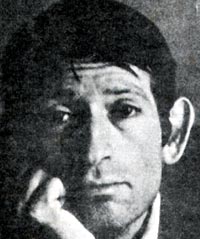By Jerry Hopkins
WHEN B. Mitchell Reed returned to his native New York in early 1963 to take over the seven-to-eleven evening shift as one of WMCA’s “Good Guys,” he was known as  coming from Hollywood radio  “The Fastest Tongue in the West.” Fifteen seconds into this CRUISIN’ volume and it will be abundantly clear why. In many ways, Reed epitomized the early ’60s radio sound, where sound effects, noisemakers, commercials and songs rattled like machine guns on the firing line. Reed’s jivey 10O-mile-an-hour rap was unequalled, and perfectly tailored for the time and medium.
BMR, as he is known today  Mitch to his friends – might have seemed an unlikely candidate for Top 40 radio because he had a masters degree in political science and early in his career, as WOR’s successor to the original “Symphony Sid,” had been strongly identified with a different sound, hosting the all-night “Birdland Jazz Show.” Picture of B. Mitchell Reed
B. Mitchell ReedBut regardless of what records he played, Reed was colorful. Nick-names  an often self-conscious display of ego indigenous to pop radio  began piling up like aliases in a Damon Runyan anthology: “The Boy on the Couch,” “The Mad Monk in the Monastery,” “The Fastest Tongue …” and when he grabbed the No. 1 spot in New York at WMCA, leaving Murray the K and Cousin Brucie tap-dancing for second, “Your Leader, the Nuttiest on the New York Turf.”
Reed’s first year as a “Good Guy,” 1963, was a pivotal year for popular music. Half a dozen musical trends continued as Jan & Dean recorded Surf City, Chubby Checker abandoned the twist for Limbo Rock, Edye Gorme told everyone to Blame It On The Bossa Nova and Trini Lopez popularized an old Lee Hays-Pete Seeger tune, If I Had a Hammer. More significant, this was the year Motown made its first real impact, with Little Stevie Wonder’s Fingertips, Heat Wave by Martha & the Vandellas, the Miracles’ You’ve Really Got a Hold On Me and the first hits of Mary Wells. Then Peter, Paul & Mary established a young singer-songwriter named Dylan with Blowin’ in the Wind and Don’t Think Twice. And in the last months of the year, the Beatles appeared. The new styles, the new sounds, were set.
The national scene was in greater, more shocking flux. School prayer was ruled unconstitutional by the U.S. Supreme Court. Over 200,000 civil rights demonstrators gathered in Washington to hear Martin Luther King say, “I have a dream …” A nuclear test-ban treaty barring all tests except those conducted underground was signed with Britain and the Soviet Union. The U.S. Surgeon-General linked smoking and cancer. And President Kennedy was shot.
By year’s end, so numbing was the assassination, nearly all of 1963’s diversions seemed forgotten. Gone from recent memory were the year’s three top award-winning films, “Lillies of the Field,” “Hud” and “Tom Jones.” Gone were Koufax and Drysdale and Podres, the Dodgers’ triple threat. Gone were all those elephant jokes. The show presented on this volume of the CRUISIN’ series is from a period six months earlier.
 Jerry Hopkins
The original Cruisin series was conceived and produced by Ron Jacobs. The “airchecks” on CRUISIN’ were not actual broadcasts, rather, they were masterful re-creations featuring legendary air talent.
Our thanks to RJ for making this classic material available to REELRADIO.


